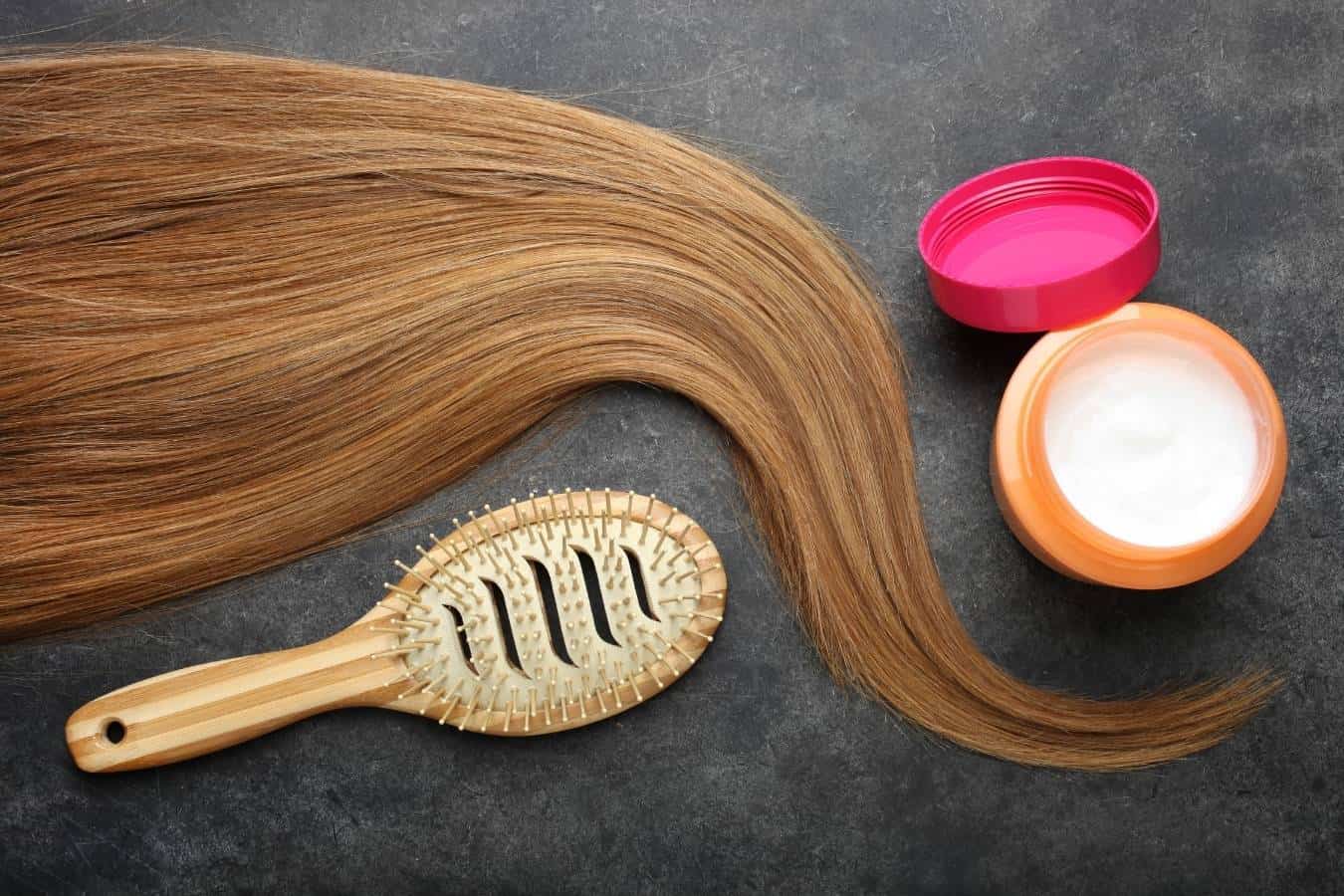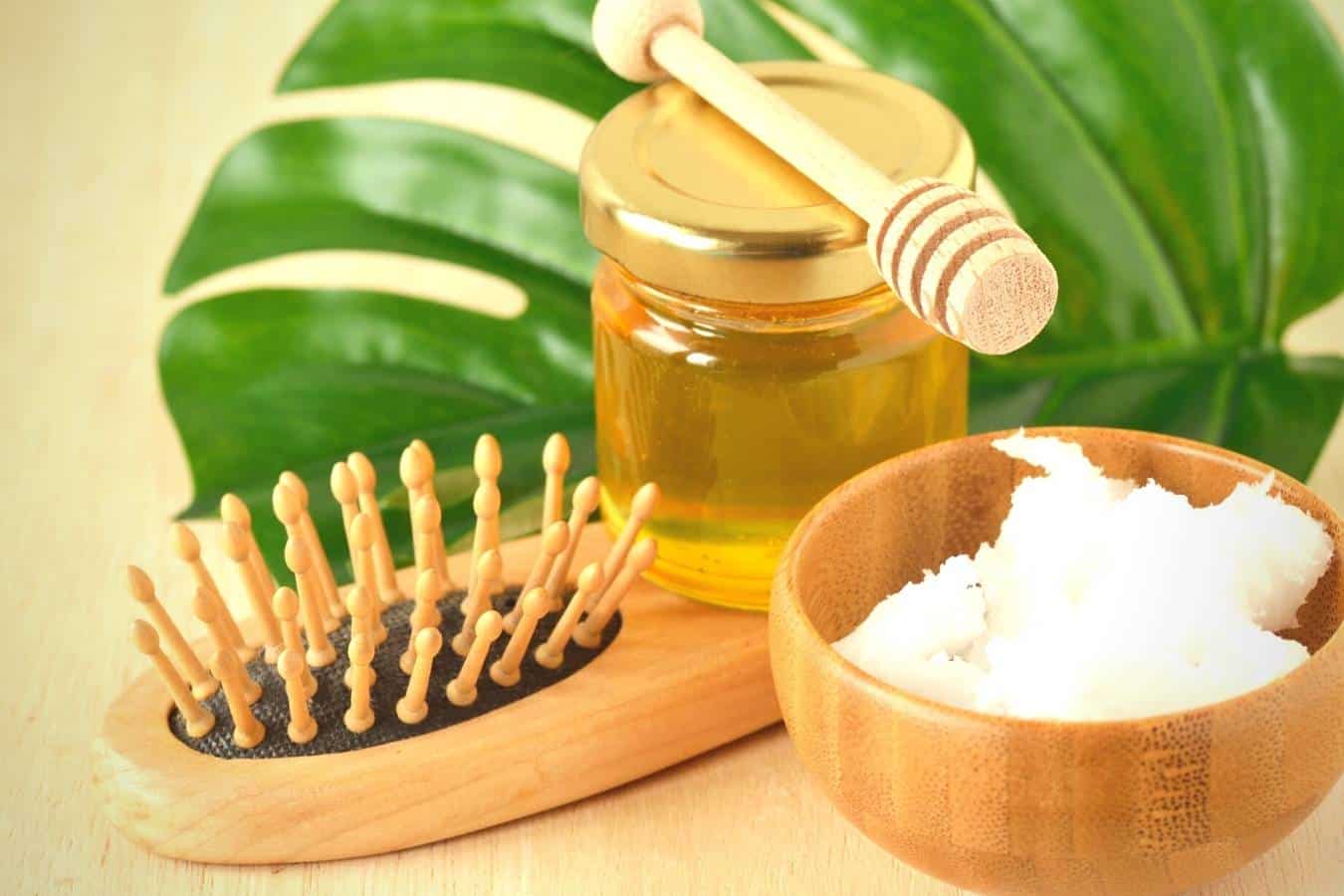Regardless of your hair type, hair mask treatments provide the perfect opportunity to moisturize and nourish your hair. Let’s look at the benefits of hair masks in more detail to discover why this treatment is worth introducing into your hair care routine.

Hair masks benefit your hair by providing additional moisture and hydration. Hair masks also strengthen your hair and eliminate frizz whilst protecting the scalp against environmental damage.
What Is A Hair Mask?
Hair masks are intensive hair conditioners.
Just like with a regular conditioner, they are designed to moisturize and nourish your hair, but on a more superior level.
This is why hair masks often contain specially formulated ingredient combinations.
Typically, hair masks contain concentrated ingredients, such as bananas, eggs, avocado oil, honey, coconut oil, aloe vera, and more.
These ingredients are natural and chock full of nutrients that leave your hair hydrated, healthy, and shiny.
The great news about hair masks is that they are versatile.
For instance, some hair masks are specifically formulated for damaged, color-treated hair, while other formulations work better for curly hair that’s prone to frizzing.
Whatever your hair type, there’s a hair mask formulation you can use to get the most benefits.
Also Read: Should I Use Heat To Deep Condition? (Best Results)
7 Benefits Of Using Hair Masks

If you’re wondering why you should use a hair mask, here are seven reasons to get you started:
Hydrates and Moisturizes Your Hair
Many people deal with dry and damaged hair all the time, but hair masks can help manage this problem.
A hydrating and moisturizing hair mask should include humectants and emollients.
Humectants help your hair to draw in moisture, while emollients lock in the moisture, keeping your hair hydrated at all times.
Glycerin and keratin are two examples of common humectants, and coconut oil and argan oil are the perfect examples of emollients.
Strengthens Your Hair
Each strand of your hair is made from a strong and fibrous protein called keratin.
However, it’s easy to end up with a lot of breakage if you style and handle your hair excessively.
When your hair becomes weak, it tends to get thin, limp, and will have split ends.
You can use a hair mask to strengthen weak hair by using a recipe that contains nourishing ingredients.
For instance, adding egg white (protein) to your hair mask can help repair weak and damaged hair.
Makes Your Hair Glossy and Softer
A common cause of dull, rough hair is open cuticles. Your hair cuticles make up the outermost layer of each hair strand, and they overlap like shingles.
When your hair cuticles are closed, your hair can lock in moisture, so it will look shiny.
For hair masks that help to keep the cuticles closed, look for ingredients like apple cider vinegar and argan oil.
Avoid rinsing your hair with hot water after applying the mask, as this can reopen cuticles.
Gets Rid of Frizz
Frizzy hair is another sign that your cuticles are open.
Frizzy hair is difficult to manage, but you can tame the frizz with the right hair mask.
For instance, some hair masks contain mayonnaise which is rich in oils that restore moisture in frizzy hair.
Bananas can also defrizz your hair because of their high water content.
Protects Your Hair from Chemical and Environmental Damage
Hair is vulnerable to chemical and environmental damage, which results in unhealthy hair.
Hair masks can help prevent this because they are packed with nutrients and beneficial properties for a deep conditioning effect.
Although your regular conditioner probably does a good job, sometimes your hair needs intense nourishment to defend against chemical and environmental damage.
Gives Your Hair Extra Body
You don’t need expensive hair salon treatments to end up with bouncy, voluminous hair.
When you use a well-formulated hair mask, especially one that contains a hydrating oil like coconut or olive oil, the oil will penetrate the hair cortex, coating each strand with moisture, which gives your hair extra body.
This is great news for those with fine hair that’s difficult to style.
Maintains a Healthy, Dandruff-Free Scalp
Dealing with an itchy and flaky scalp can be frustrating. Luckily, there are hair masks designed to address this issue.
Hair masks that treat dandruff contain ingredients with antimicrobial properties, such as apple cider vinegar and honey.
These ingredients are effective against dandruff and itchiness caused by fungal growth, but they might not work if the root problem is hormonal.
Also Read: Best Shampoos And Conditioners For Tangled Hair
What Are the Best Ingredients Used in Hair Masks?

The majority of hair mask ingredients can be found in your home:
Bananas
A look at the nutritional profile of bananas shows that they are not only rich in potassium but also contain silica and an assortment of vitamins that are all good for your hair.
The silica content in bananas can help stimulate collagen production, a structural protein needed for healthy and thick hair.
Research also shows that bananas have antioxidant properties that combat oxidative stress that results in aging hair.
Eggs
Eggs are a rich source of protein that’s concentrated in egg whites.
Egg whites contain essential amino acids, and these proteins are crucial for hair growth.
That’s because your hair is mainly composed of keratin, a fibrous, structural protein.
Therefore, most people believe that giving hair protein treatments via egg masks helps to strengthen and repair damaged hair.
Honey
Honey is another natural ingredient that offers some sweet hair mask benefits.
Honey has excellent moisturizing properties, which makes it the ideal choice for any conditioning treatment.
In addition, honey has some dermatological benefits for your scalp.
If dandruff is a problem, a honey hair mask comes with antibacterial, anti-inflammatory, antioxidant, and antiviral properties to combat the issue.
Coffee
Coffee can do more than give you a quick boost in the morning.
It can also give your hair the pick-me-up it needs because it improves moisture retention while giving your locks a glamorous sheen.
One study shows that caffeine can help stimulate hair follicle growth in males.
A coffee rinse can also be used as a DIY treatment for gray hairs.
Shea Butter
Shea butter is an edible fat derived from the nut of the Africa Shea tree. Shea butter is well known for its intense moisturizing effect, and it also works to prevent hair breakage.
According to a science journal, topical application of shea butter can offer anti-inflammatory and anti-aging benefits, which spells good news for your hair and scalp.
Argan Oil
Argan comes from the kernels of the argan tree that’s indigenous to Morocco. Argan oil has a rich profile that includes squalene, a powerful emollient that helps your hair lock in moisture.
Argan oil has also been investigated for its hair protective effect, and it appears to prevent hair damage caused by color treatments.
Coconut Oil
Organic, unrefined coconut oil provides the best results when used as a hair mask. Coconut oil is rich in fatty acids and proteins, and according to research, it can prevent hair damage.
Unlike mineral oil, coconut oil penetrates the hair shaft, strengthening and moisturizing your hair with each application.
Coconut oil also has antibacterial properties that can treat dandruff caused by fungal growth.
Apple Cider Vinegar
Because of its acidic nature, apple cider vinegar helps to establish the proper pH balance for your hair and scalp.
When your hair is acidic, the hair cuticles tend to be closed, which gives your hair a natural sheen.
Apple cider vinegar also has antimicrobial properties that help get rid of dandruff.
Also Read: The Best Shampoos And Conditioners For Balayage Hair In 2021
3 DIY Hair Mask Recipes
These are some of the best at-home hair masks that provide the most benefits in a single application:
DIY Hair Mask That Moisturizes
This DIY hair mask will keep your hair hydrated because the ingredients have excellent moisturizing properties:
Recipe
- 1 ripe avocado
- 1 tablespoon argan oil
- 1 tablespoon honey
- 1 teaspoon coconut oil
Instructions
- Whisk or blend all the ingredients until the mixture becomes smooth.
- Apply evenly through your hair.
- Let it sit for 30 minutes before rinsing.
DIY Hair Mask for Eliminating Frizz
Here’s an all-natural hair mask that will give you the upper hand over frizzy hair:
Recipe
- 1 ripe avocado
- 1 tablespoon olive oil
- ½ cup fresh coconut milk
Instructions
- Throw the avocado into a blender and blend until free of chunks.
- Add the coconut milk and olive oil and blend until the mixture is smooth.
- Apply the hair mask generously, starting from the tips and working your way towards the ends.
- Also, massage the mixture into your scalp using gentle, circular motions.
- Wash off the mask after 15-30 minutes.
DIY Mask for Color Treated Hair
If you have recently bleached or color-treated your hair, you can prevent hair damage with this hair mask.
Recipe
- 1 banana, peeled
- 1 tablespoon honey
- 2 tablespoons coconut oil
- plastic wrap
- Shower cap
Instructions
- Add all the ingredients to a blender and blend until there are no more banana chunks.
- Apply the creamy mixture to your hair in sections.
- Put your hair up and wrap it up with cling wrap.
- Wear a shower cap to hold it all in and leave it in for up to an hour.
- Rinse your hair and let it dry.
How Often Should You Use Hair Masks?
With all the hair mask benefits outlined above, does it mean you should use hair masks every chance you get?
It all depends on how badly your hair needs treatment.
If your hair is in good condition, you can swap out your regular conditioner with a mask once or twice a week.
However, you’re free to use hair masks as often as you need to achieve extra smooth and shiny hair. Just be careful about overnight hair mask treatments.
Some formulations are not designed to be left in your hair for too long.
For instance, hair masks that contain protein can leave your hair feeling too soft, slippery, and heavy.
Over-conditioned hair can become dry and weak with time, leading to breakage (hygral fatigue).
Disclaimer: This site is not intended to provide professional or medical advice. All of the content on LovedByCurls.com is for informational purposes only. All advice should be followed at your own discretion. Ingredients may change at any time so always check the product label before using. Check our full disclaimer policy here.
